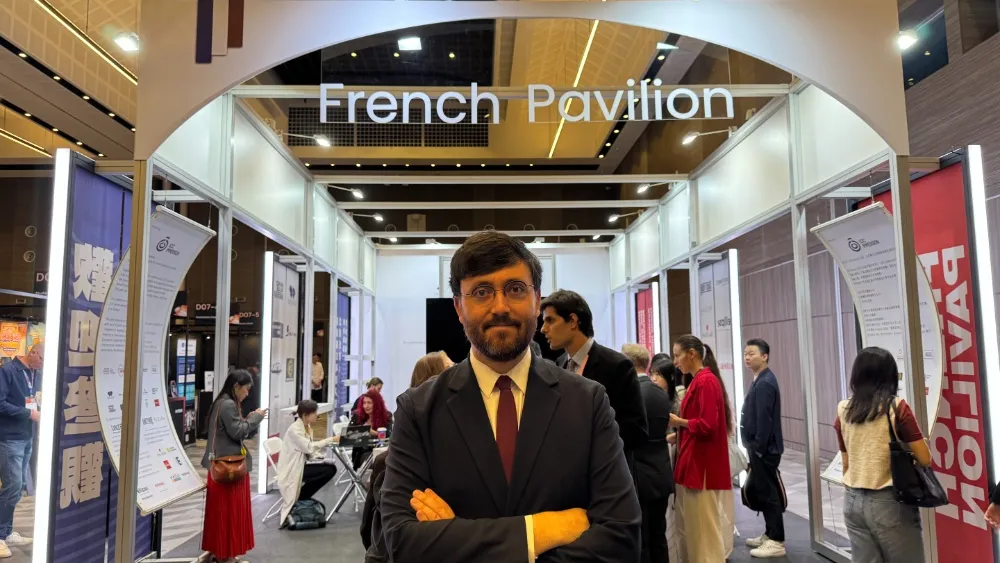Copyright Variety

France’s National Film Board is doubling down on Asia as the region emerges as a vital creative force in a shifting global entertainment landscape, CNC president Gaetan Bruel tells Variety. Speaking at the Taiwan Creative Content Fest in Taipei, where France arrived with its second-largest delegation of 80 professionals after Korea, Bruel outlines an ambitious strategy that positions France and Europe as rising creative powers. “The fact that there is a crisis ongoing at Hollywood, that’s good news for no one, because we need their movies,” Bruel says. “But for too many years, we were just thinking mainly about how the U.S. were organizing the global ecosystem. What’s happening now is that Europe is rising as a cultural and creative power.” The Centre National du Cinéma et de l’Image Animée (CNC) chief points to concrete results: This year, one-third of the 86 films submitted for the international feature Oscar category were co-produced by France, with more than 20 directly funded by CNC. The success stems from 80 years of work that has made France the world’s third-largest box office after the U.S. and China, up from fifth place, and Europe’s leading streaming market. Taiwan has emerged as a key partner in France’s pivot toward Asia, particularly in virtual reality. The collaboration began six years ago when CNC and Taiwan Creative Content Agency (TAICCA) recognized a natural synergy: Taiwan’s hardware expertise combined with France’s content leadership. “Taiwan is the leading territory for the hardware, for the technology, so it would make a lot of sense for them to take advantage of that, to be also a leading territory for the content themselves,” Bruel explains. The partnership has yielded major results. HTC pivoted into VR following these discussions, and Taiwan recently won the top prize at the Venice Film Festival’s VR competition with Singing Chen’s “The Clouds Are Two Thousand Meters Up.” France itself has won the largest number of international VR festival prizes over the past 15 years. A French-Taiwanese co-production between Federation Entertainment’s Pascal Breton and “The Bureau” creator Eric Rochant, announced at TCCF last year, continues to advance. The series represents an ambitious project for both territories. “It’s not only the continuity of ‘The Bureau’ – the same atmosphere, the same topics – but it’s also how different cultures, one of Taiwan, one of France, can be merged into a global future hit,” says Bruel, who has worked on “The Bureau.” Beyond individual projects, CNC is helping position Taiwan as a co-production hub that can work with multiple countries, not just France. In animation, where Taiwan has long served as a supply production system for foreign content, France is now supporting the development of Taiwanese IP. Leading French animation school Gobelins has partnered with the Taiwanese ecosystem. Indonesia represents another major opportunity. While global theatrical attendance dropped 40% between 2019 and 2024, Indonesia’s grew 55%, driven by urban migration and the popularity of Indonesian horror films. Following French President Macron’s state visit in May, Bruel traveled to Indonesia in July to develop a multi-pillar strategy. CNC has sent an expertise mission to Jakarta on film preservation, addressing the urgent need to save analog archives as digital expertise replaces traditional skills. “The French model doesn’t cost even a single euro to the state, because it’s a model that just relies on the dynamic of the market,” Bruel says, explaining how France funds its film ecosystem through a 10% levy on movie tickets and streaming subscriptions rather than direct government budgets. The goal is to help Indonesia build domestic audiences for its festival-acclaimed cinema, which currently struggles to compete with American and Chinese films in local multiplexes. CNC is exploring partnerships on art house cinema networks and film education programs. Film education represents a crucial element of France’s international strategy. In Taiwan, CNC worked with the Fubon Foundation 13 years ago to develop a nationwide film education program modeled on France’s approach. “France is not only about cinema as business or just entertainment, it’s about cinema and moving image as culture as a way to emancipate people, to empower countries,” Bruel says. He identifies a global paradox: People spend more time on screens than ever but less time watching movies and series, as audiences shift to free and social platforms. This threatens premium content models while piracy resurges. “Cinema is both threatened by our relationship with screens, but at the same time, it’s the remedy, is the solution,” Bruel says. “Today, it’s about reinventing cinema.” Europe’s emergence as a creative power stems partly from the AVMS directive, which has created streaming investment obligations in 16 countries over the past five years, with 10 more considering implementation. France was among the first to require streaming services to invest a percentage of local revenue in domestic content. The approach contrasts with the U.S. market, where streamers face no such obligations. Beyond Taiwan and Indonesia, CNC is actively developing partnerships with Japan, Korea and China. “China is a big topic for us as well,” Bruel notes. France’s Taiwan Creative Content Fest delegation spans multiple sectors, including leading independent distributor Carlotta Films, which recently revived interest in late Taiwanese auteur Edward Yang’s films through new releases and publications, as well as top VR companies and festivals including Annecy. “We do not only believe in French cinema,” Bruel says. “Even more importantly, we believe in a universal idea of cinema and of the moving image.”



